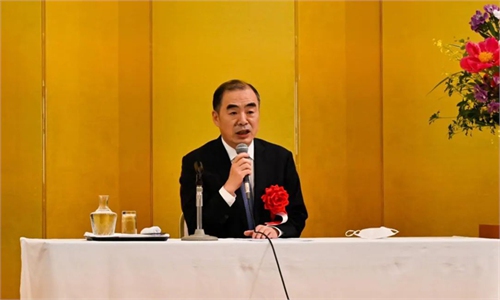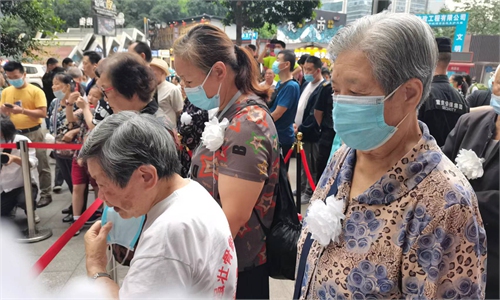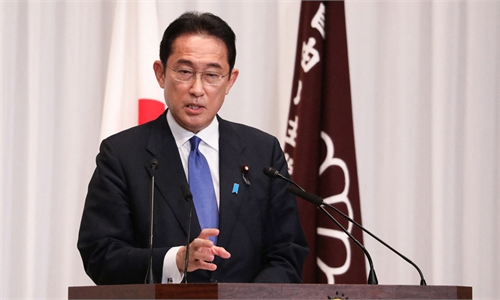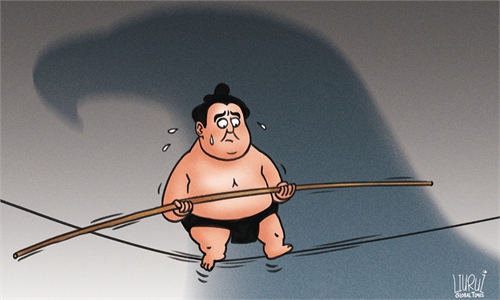Japan upping ante on Taiwan question, NATO expansion causes concern in Asia-Pacific
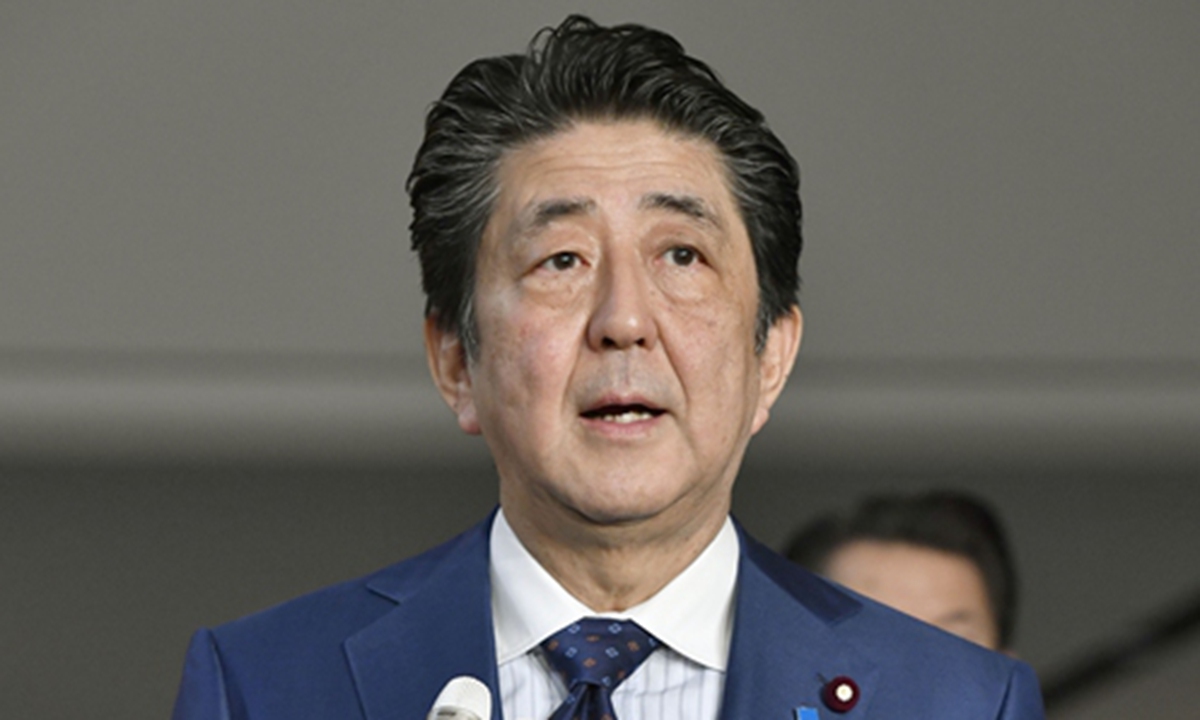
Former Japanese Prime Minister Shinzo Abe Photo: IC
Japan has continued walking down a dangerous path as a former Japanese prime minister recently urged allies to "force China to give up seizing the island of Taiwan" and its current prime minister is reportedly preparing to attend NATO summit amid the Russia-Ukraine crisis later this month, a move that is seen as to help NATO's expansion into the Asia-Pacific region. Experts warned that, as Tokyo constantly plays with fire over the Taiwan question, those reckless tactics could lead to severe consequences beyond damaging China-Japan relations, escalating confrontation and causing instability in the region, and Asian countries should remain vigilant over Japan reviving militarism.
Shinzo Abe, the former prime minister of Japan, said at a forum on Sunday that Japan, the US and other allies "must create a situation that forces" the Chinese mainland to "give up seizing" the island of Taiwan "by force," and Japan-US, Japan-US-Taiwan or Quad relations should be strengthened, Abe was quoted as saying in media reports on Monday.
It was not the first time Abe provoked over the Taiwan question, and he previously said that "any emergency over Taiwan would mean an emergency for Tokyo." The latest remark came as Japanese Prime Minister Kishida Fumio is reportedly preparing to attend the NATO summit later this month, who will also be the first Japanese leader to participate in the meeting of the military alliance.
Kishida hopes to explain to NATO members that Japan will keep in step on the Ukrainian situation and that unilateral attempts to change the status quo by force must not be tolerated anywhere in the world, having China and North Korea in mind, the NHK reported on Saturday.
Japanese Prime Minister's attendance at the NATO meeting is widely seen as a step to enhance US-Japan alliance, given that Japan is strategically important to the US in its Indo-Pacific Strategy, and some experts said it also showed that Japan may have doubts about whether the US would intervene, for example, in a conflict between Japan and China over the Diaoyu Island, so Japan needs a strong partnership with other alliances like NATO.
Japan seeks to acquire more "bargaining chips" not only on diplomacy but also on defense for containing China or Russia. With the US-Japan-South Korea, AUKUS and the Quad, it has been actively engaging in different multilateral security mechanisms and sees the "charm" of collective defense through the Russia-Ukraine crisis, Da Zhigang, director of the Institute of Northeast Asian Studies at Heilongjiang Provincial Academy of Social Sciences, told the Global Times on Monday.
"If Japan only relies on one country to counter China or Russia, it would be difficult to do so. So it has to seek more advantages by introducing NATO and European forces into the Indo-Pacific and East Asia," Da said.
Severe consequences
As the US steps up efforts to contain China's rise, Japan has been actively assuming the role of serving Washington's Indo-Pacific Strategy and countering Beijing, and it also believes that the Ukraine crisis gives Beijing the opportunity to be more assertive in the Asia-Pacific region including on the Taiwan question. It also planned to increase its defense budget to 2 percent of its GDP within five years.
Japan's defense spending may prove a key deterrent to China's regional ambitions, Kevin Maher, the former Japan office director at the State Department, was quoted as saying in a report by Fox News. The former US official also noted that if there were a conflict between China and Japan, "the Japanese contributions together with the US are very significant."
Considering the policy of "substantial increase in defense spending" announced by Kishida at Japan-US summit in May, the Japanese government has also begun to consider expanding its stockpile by accelerating the acquisition of missiles and ammunition operated by the Self-Defense Forces, according to Japanese media reports on Sunday. It will be reflected in the medium-term defense capability development that will be formulated at the end of this year and such expansion aims to strengthen the defense capabilities over the Taiwan Straits situation, media reports said.
The US and other Western countries do not consider Japan's measures to strengthen defense capability, including an increase in military spending, a signal of reviving militarism, many regional countries that have been invaded by Japan, including China, are suspected of Japan's motivation, Da noted.
Japan is using the Ukraine crisis as an excuse to justify boosting military spending, thus dodging the international community's scrutiny and criticism, making it more difficult for the outside world to build a united front to resist the resurgence of Japanese militarism, he said.
Some experts also warned that such aggression of provoking the core interests of China, and help NATO's expansion to Asia would lead to severe consequences that not only damage China-Japan ties but also create new turbulence in the region.
Zheng Yongnian, a professor at the Chinese University of Hong Kong, Shenzhen, and president of the Institute for International Affairs, Qianhai, also warned in an interview with the Global Times in May that the US wants to create an Asian NATO, through bilateral alliances, the trilateral AUKUS deal, the Quad, and the Five Eyes alliance, which are all aimed at China.
If an Asian NATO comes into being, there will never be peace in Asia. Zheng said, noting how Asian countries build an Asian community with a shared future is very important.
Crucial crossroads
Year 2022 marks the 50th anniversary of diplomatic relations between China and Japan. Chinese Ambassador to Japan Kong Xuanyou said recently that the relations between China and Japan are at a crucial crossroads, as Japan, in an apparent collaboration with the US, is increasingly considering China a strategic threat.
The Chinese envoy urged Japan not to cross the red line on the Taiwan question, warning a "destructive impact" on bilateral ties if the situation is not handled properly.
However, Japan's right-wing groups and politicians continued hyping the so-called threat of China to justify amending the pacifist constitution and calling for increasing the defense budget to achieve their political agenda.
Reviving militarism may not be displayed in Japan in the foreseeable future, but it cannot be ruled out that there are people in Japan who are actively promoting the progress of Japan's militarization, Lian Degui, director of the Department of Japanese Studies at Shanghai Institutes for International Studies, told the Global Times on Monday.
"They are either hyping issues related to the Taiwan question or the South China Sea, or even the Ukraine crisis. Those are excuses for Japan to amend its constitution and increase military spending," Lian said, noting that this is also one of Japan's tactics to shift the Ukraine crisis to East Asia and drag China into the conflict.

